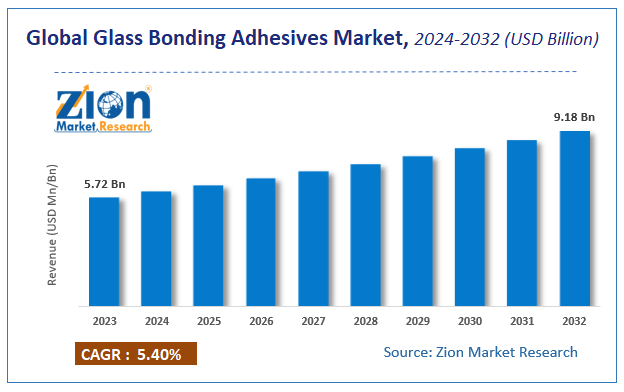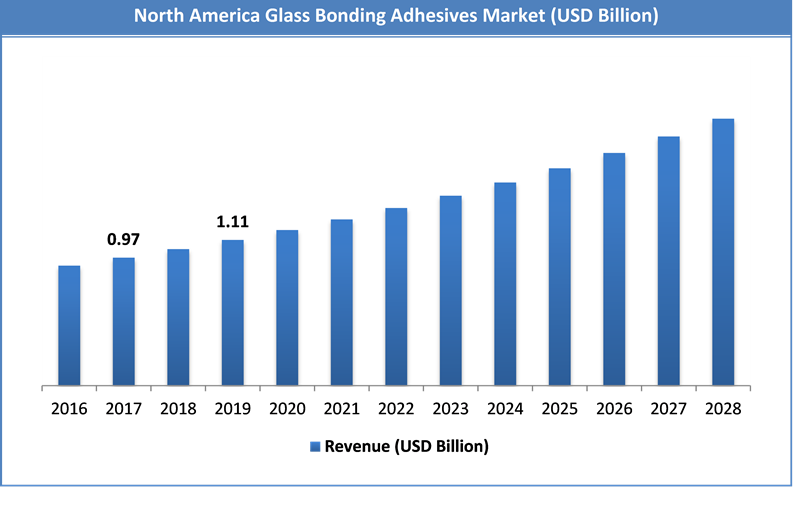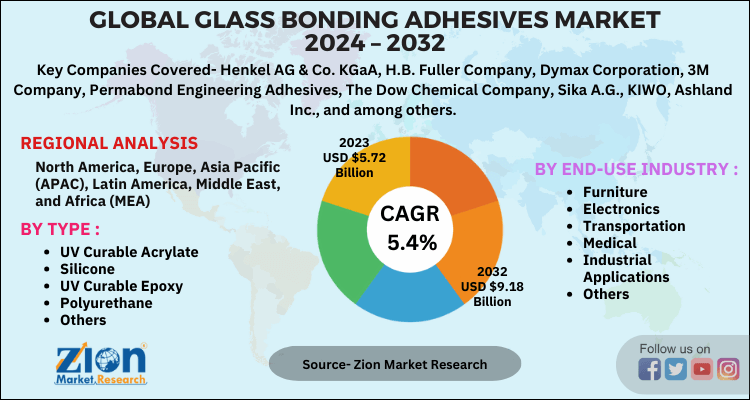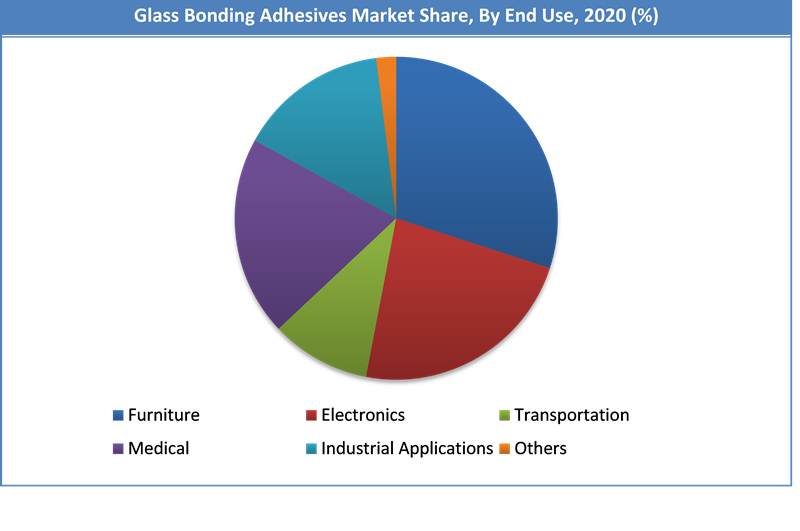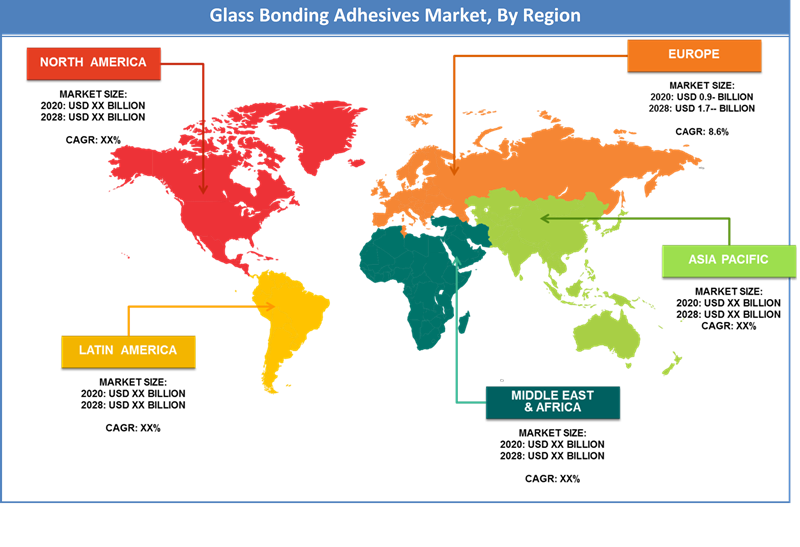Glass Bonding Adhesives Market Size, Share, Growth Report 2032

Glass Bonding Adhesives Market By Type (UV Curable Acrylate, Silicone, UV Curable Epoxy, Polyurethane, Others), By End Use Industry (Furniture, Electronics, Transportation, Medical, Industrial Applications, Others): Global Industry Perspective, Comprehensive Analysis and Forecast, 2024 - 2032
| Market Size in 2023 | Market Forecast in 2032 | CAGR (in %) | Base Year |
|---|---|---|---|
| USD 5.72 Billion | USD 9.18 Billion | 5.4% | 2023 |
Glass Bonding Adhesives Market Insights
Zion Market Research has published a report on the global Glass Bonding Adhesives Market, estimating its value at USD 5.72 Billion in 2023, with projections indicating that it will reach USD 9.18 Billion by 2032. The market is expected to expand at a compound annual growth rate (CAGR) of 5.4% over the forecast period 2024-2032. The report explores the factors fueling market growth, the hitches that could hamper this expansion, and the opportunities that may arise in the Glass Bonding Adhesives Market industry. Additionally, it offers a detailed analysis of how these elements will affect market demand dynamics and market performance throughout the forecast period.
Market Overview
Glass bonding adhesives are used in a variety of applications such as structural and decorative glass. These glass bonding adhesives are used to bond glass to metal, glass to glass, or numerous other substrates. These adhesives form a very strong bond for load bearing joints, which is found in glass furniture and display cases. Glass bonding adhesives are available in the form of UV/LED curing systems, cyanoacrylates, epoxies, polyurethanes, and silicones. They show a high performance even upon exposure to hostile conditions. The substrates which need glass bonding must possess different thermal expansions.
Growth Factors
The growth in the global glass bonding adhesives market is driven by rising investment in the manufacturing plants such as the wind, automotive, structural projects, infrastructure development industries, rail, and aerospace. Increasing demand from end-use industries such as furniture, electronics, and transportation for high-quality and high-performance glass bonding adhesives is anticipated to foster the growth in the global glass bonding adhesives market. Cutting edge adhesive formulations are available for bonding glass to glass and to numerous other substrates including plastics, metals, and rubbers. These compounds are developed as epoxies, silicones, polyurethanes, polysulfides, cyanoacrylates and UV/LED curing systems. They are designed to provide optimal performance even upon exposure to hostile conditions.
Select formulations exhibit good wetting characteristics, low shrinkage, superior impact/vibration resistance and stress absorption when bonding materials with different coefficients of thermal expansion. A range of viscosities/cure speeds are available to improve efficiency, productivity and cost effectiveness. Compounds are engineered to adhere well to different types of glass such as borosilicate, fused quartz, glass ceramic and glass fiber surfaces. Products exhibit outstanding long term durability even upon exposure to hot, cold, humid environments. This are some of the major advantages which is driving the growth of glass bonding adhesive market.
Glass Bonding Adhesives Market: Report Scope
| Report Attributes | Report Details |
|---|---|
| Report Name | Glass Bonding Adhesives Market |
| Market Size in 2023 | USD 5.72 Billion |
| Market Forecast in 2032 | USD 9.18 Billion |
| Growth Rate | CAGR of 5.4% |
| Number of Pages | 178 |
| Key Companies Covered | Henkel AG & Co. KGaA, H.B. Fuller Company, Dymax Corporation, 3M Company, Permabond Engineering Adhesives, The Dow Chemical Company, Sika A.G., KIWO, Ashland Inc., and among others |
| Segments Covered | By Type, By End-Use Industry and By Region |
| Regions Covered | North America, Europe, Asia Pacific (APAC), Latin America, Middle East, and Africa (MEA) |
| Base Year | 2023 |
| Historical Year | 2018 to 2022 |
| Forecast Year | 2024 - 2032 |
| Customization Scope | Avail customized purchase options to meet your exact research needs. Request For Customization |
End-Use Segment Analysis Preview
The glass bonding adhesive market has been segmented, by End-use industry, into Furniture, Electronics, Transportation, Medical, Industrial Applications, and Others. Furniture Industry holds the maximum share of around 30% of the total segmentations. This segmentation is based on the nature of the application in which the adhesives is being used. A basic glass bonding adhesive is most commonly used because of its cost-effectiveness. The nature of this adhesive impacts the applications in which it is being used and also the kind of users that are implementing the same.
Type Segment Analysis Preview
The glass bonding adhesive market has been segmented, by type, into UV Curable Acrylate, Silicone, UV Curable Epoxy, Polyurethane, and Others. The UV Curable Acrylate segment dominated the market in 2018 and is expected to grow the glass bonding adhesive market during the forecast period. This is primarily because these adhesives are cost-effective and are preferred for the installation in various assemblies.
Regional Analysis Preview
Asia Pacific dominated the global glass bonding adhesive market in 2018 because the region comprises relatively developing countries that require cost-effective bonding solutions. The industrial and commercial & residential sectors, along with the other sector, proved to be the major consumers of these bonding adhesives. The Asia Pacific region is expected to lead the market during the forecast period. China, Singapore, South Korea, Japan, and India are considered the main industrial hubs and offer tremendous growth opportunities for the glass bonding adhesive market in this region.
Key Market Players & Competitive Landscape
Some of key players in Glass Bonding Adhesives market are:
- Henkel AG & Co. KGaA
- H.B. Fuller Company
- Dymax Corporation
- 3M Company
- Permabond Engineering Adhesives
- The Dow Chemical Company
- Sika A.G.
- KIWO
- Ashland Inc., and among others.
There are few of the recent trends and developments in the past few years.
In January 2021, Dow launches fast curing silicone adhesive for reduced energy usage, greater assembly efficiency at any production volume.
In September 2014, Henkel announces it has signed an agreement to acquire the privately-held global thermal management solutions supplier The Bergquist Company. Based in Chanhassen, Minnesota, USA, Bergquist was founded in 1964.
The Glass Bonding Adhesives market is segmented as follows:
By Type
- UV Curable Acrylate
- Silicone
- UV Curable Epoxy
- Polyurethane
- Others
By End-Use Industry
- Furniture
- Electronics
- Transportation
- Medical
- Industrial Applications
- Others
By Region
- North America
- The U.S.
- Canada
- Europe
- France
- The UK
- Spain
- Germany
- Italy
- Rest of Europe
- Asia Pacific
- China
- Japan
- India
- South Korea
- Southeast Asia
- Rest of Asia Pacific
- Latin America
- Brazil
- Mexico
- Rest of Latin America
- Middle East & Africa
- GCC
- South Africa
- Rest of Middle East & Africa
Table Of Content
Methodology
FrequentlyAsked Questions
The Glass Bonding Adhesives market was valued at US$ 5.72 Billion in 2023
The Glass Bonding Adhesives market is expected to reach US$ 9.18 Billion by 2032 at a CAGR of about 5.4% from 2024 to 2032.
Adhesives have been the most cost-effective technology. However, with the rise of different advance technologies, especially the UV Adhesive, conventional adhesives are losing out on the cost-effectiveness quotient. Low cost adhesives are witnessing a price drop nearly across all industries.
The Asia Pacific region is expected to lead the market during the forecast period. China, Singapore, South Korea, Japan, and India are considered the main industrial hubs and offer tremendous growth opportunities for the glass bonding adhesive market in this region.
Some of the major companies operating in the Glass Bonding Adhesives market are Henkel AG & Co. KGaA, H.B. Fuller Company, Dymax Corporation, 3M Company, Permabond Engineering Adhesives, The Dow Chemical Company, Sika A.G., KIWO, Ashland Inc., among others.
RelatedNews
HappyClients
Zion Market Research
Tel: +1 (302) 444-0166
USA/Canada Toll Free No.+1 (855) 465-4651
3rd Floor,
Mrunal Paradise, Opp Maharaja Hotel,
Pimple Gurav, Pune 411061,
Maharashtra, India
Phone No +91 7768 006 007, +91 7768 006 008
US OFFICE NO +1 (302) 444-0166
US/CAN TOLL FREE +1 (855) 465-4651
Email: sales@zionmarketresearch.com
We have secured system to process your transaction.
Our support available to help you 24 hours a day, five days a week.
Monday - Friday: 9AM - 6PM
Saturday - Sunday: Closed

